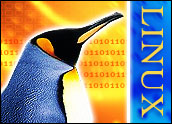
The Linux Foundation announced on Tuesday its new board of directors, all of whom were chosen to represent the key stakeholders from every corner of the Linux universe, according to the organization.
The diverse group includes members from big companies like IBM, Oracle, Intel and Novell, as well as prominent individuals such as Ubuntu Founder Mark Shuttleworth.
The Linux Foundation is new and old at the same time — it was founded this year by the merger of the Open Source Development Labs and the Free Standards Group. The idea behind the board structure, according to the organization, is to ensure that multiple voices from the Linux ecosystem are represented.
“It is essential that the Linux Foundation’s board bring every Linux constituency’s issues and opportunities to the table,” said Jim Zemlin, executive director of the Linux Foundation. “With leadership from the kernel, legal, user, distro and vendor communities, the Linux Foundation synthesizes the top priorities of its diverse constituencies to provide services that move Linux even further ahead in today’s competitive market. We have ensured that a diversity of interests is represented on our board.”
A Closer Look
With many of the board members working day jobs at major global corporations, the Linux Foundation has an opportunity to drive real-world Linux adoption further throughout businesses and better compete with Microsoft Windows operating systems.
“The Linux Foundation has a great chance to move Linux as a platform forward,” Markus Rex, Novell’s vice president of services strategy, told LinuxInsider. “A single organization in the Linux area, focused on applications, can move things. It is also very good for Linux to see all the major players contribute to the Linux Foundation at various levels, especially in the standardization workgroups, where a healthy participation is visible.”
Rex also noted that he believes the Linux ecosystem needs to make application development easier for developers, matching the ease of Mac, Windows and Unix.
Shuttleworth, for his part on the board, told LinuxInsider that he is confident in the Linux Foundation’s goal and ability to accelerate the adoption of Linux in the real world.
“My focus will be further standardization of the OS layer, to simplify the lives of ISVs who want to reach customers, each of whom have their own preferences of Linux, and generate broader support for current hardware, devices and peripherals,” he said.
Across the Board
The following are among the Linux Foundation’s board of directors:
- James Bottomley — Linux subsystem maintainer and vice president and chief technology officer at SteelEye, Bottomley is an active member of the open source community and maintains the SCSI subsystem, the MCA subsystem, the Linux Voyager port and the 53c700 driver. Bottomley is the foundation’s Technical Advisory Board representative.
- Wim Coekaerts — Linux VM tester and director of Linux engineering at Oracle, Coekaerts manages Oracle’s Unbreakable Linux strategy. His group is working on and contributing to the first Cluster File System to be accepted into the Linux mainline kernel in 2006.
- Masahiro Date — General manager at Fujitsu, Date has been involved in operating systems at the firm, including development and development management of Fujitsu proprietary operating systems and Solaris and Linux. Date has been active in the Linux community for many years, including serving as director of OSDL and FSG.
- Doug Fisher — Vice president, Intel’s Software and Solutions Group (SSG) and general manager of SSG’s Systems Software Division, Fisher is a veteran IT executive with a rich history at HP and today at Intel. He leads a worldwide organization responsible for a wide range of software development, including Intel’s Linux and open source initiatives, and is the Intel corporate owner for virtualization.
- Dan Frye — Vice president, Open Systems Development at IBM, Frye is responsible for overseeing IBM’s Linux technical strategy and IBM’s participation in the open source Linux development community. He has also led IBM’s Emerging Technologies and Business Opportunities team and coauthored the original IBM corporate strategies for Linux and open source.
- Tim Golden — Senior vice president at Bank of America, Golden has for the past five years worked exclusively with Linux and open source software, leading several enterprise-level solution architecture, risk management, and infrastructure lifecycle management initiatives. He is also affiliated with several community-based organizations, provides consultation to industry financial analysts and occasionally works for select clients as an Olliance Group senior consultant.
- Hisashi Hashimoto — Section manager at Hitachi, Hashimoto is responsible at Hitachi for both workstations and mainframes. He also works with the Open Source Software Technology Center and is responsible for collaboration with other vendors and the OSS community, including work with the Open Source Software Promotion Forum in Japan.
- Christine Martino — Vice president of the Open Source & Linux Organization (OSLO) at HP, Martino is responsible for HP engineering, marketing, open source community participation and linkage, as well as HP’s Open Source and Linux indemnity and IP protection programs.
- Marc Miller — An open source software expert in the AMD Developer Outreach program, Miller is currently entering the seventh year of his tenure with AMD and is bridging a critical gap between software development and cutting-edge microprocessor technology.
- Brian Pawlowski — Vice president and chief technology officer of Product Operations at NetApp, Pawlowski has been working on open protocols for storage since his earlier position at Sun Microsystems and was coauthor of the NFS Version 3 specification.
- Markus Rex — Vice president of Services Strategy at Novell, Rex is responsible for guiding the strategic direction of the technology platform and providing insight and guidance to the product development organization.
- Tsugikazu Shibata — A senior manager at NEC, Shibata has an extensive background in the development and management of proprietary operating systems, including work with mainframes and super computers, and belongs to the Open Source Software Promotion Center of NEC where he works collaboratively with vendors and the open source community.
- Mark Shuttleworth — The founder of Ubuntu, an enterprise Linux distribution that is freely available worldwide and has both cutting-edge desktop and enterprise server editions.
- Andrew Updegrove — Cofounder and partner of Gesmer Updegrove, he is regarded as one of the most influential legal experts on open standards and how they relate to open source and IP. Updegrove has worked with more than 75 consortia, accredited standards development organizations and open source consortia, and has assisted many of the largest technology companies in the world in forming such organizations.
- Christy Wyatt — Vice president, Ecosystem and Market Development, Mobile Devices at Motorola, Wyatt is responsible for building a healthy software economy around Motorola’s handset platforms and for taking Motorola’s platform strategy to carrier partners. She leads teams charged with carrier market development, software alliances and the Motodev developer program.
What’s Next?
The Linux Foundation is funding and introducing a new testing initiative later this year.
“The LF Test Framework will interlink the various moving parts that make up the Linux platform,” Zemlin told LinuxInsider. “All these various moving parts have enabled Linux to succeed and be developed in a distributed fashion — just imagine the power of a testing framework that actually interlinks those moving parts and allows upstream package developers and downstream distribution vendors to coordinate their work.”
The testing framework will also give independent software vendors (ISVs) a more effective way to provide feedback to the Linux ecosystem. The framework will be free for anyone to use under the Gnu Public License (GPL), and the associated database will expose APIs so that other Web services can integrate with the framework.
“Testing may not be the sexiest part of computing,” Zemlin noted, “but if I were Microsoft, I would be worried about this major initiative of the Linux Foundation.”




















































